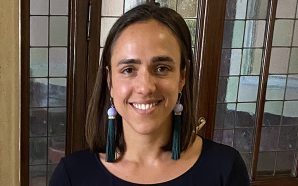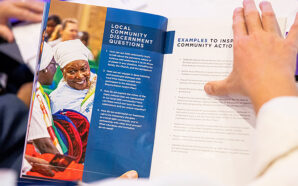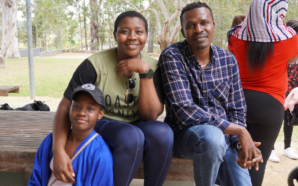A Maryknoll priest attending the Synod says synodality is an ongoing process.
The idea of synodality at the heart of the Synod of Bishops that meets for a second session in October harkens back to the early days of the Church, and at its core synodality reflects the Church’s missionary spirit, says Maryknoll Father William LaRousse.
Father LaRousse, who is based in Thailand and serves as the assistant secretary general of the Federation of Asian Bishops’ Conferences (FABC), was tapped to be a member from Asia of the XVI Ordinary General Assembly of the Synod of Bishops, generally known as the “Synod on Synodality.”
“It’s not just a synodal church, it’s a synodal missionary church,” says Father LaRousse, who participated in the first session of this multi-phase synod in October 2023 and will return to Rome for the second and final session this October.
The word synodality comes from the word synod, which means “walking together” in Greek, and is expressed in the synod theme of “Journeying Together.” Father LaRousse says “the word synod goes way back in the Church,” and while the word synodal was not used at Vatican II, its principles were there, according to the International Theological Commission.
In announcing this synod in October 2021, Pope Francis invoked Vatican II, emphasizing that communion and mission were the “main lines” enunciated by the Council. He added a third theme, participation. Father LaRousse explains that each of the three topics of communion, participation and mission were broken down into 15 questions to be discussed by the 364 voting participants at the synod. Pope Francis brings the total participants to 365.
While Pope Francis has called the Synod on Synodality “something truly important for the Church,” others have gone further, saying it is the major event in the Church following the Second Vatican Council.
The motive behind this synod, the fifth of Pope Francis’ papacy, is to make the Church more missionary and inclusive, which is reflected in the topic of participation and in the integration of lay men and women who for the first time have a vote during deliberations.
Not only are lay people included with the right to vote, Father LaRousse says, but the whole structure of the meetings is different. The seating arrangement breaks from the traditional hierarchical pattern where bishops would be seated by rank and seniority. Instead of an auditorium or amphitheater setting, members of this synod sit at round tables for 12 people each.
The seating was mixed, he says. “Unlike before, there’s a cardinal sitting next to a laywoman or a sister or a priest.”
Each member has a computer tablet with which to sign in, vote and request to speak. A screen, microphone and camera are provided for every three people. All can clearly see who is speaking.
The dress code for bishops was relaxed, Father LaRousse adds. They were not expected to wear filetata — cassocks, sashes and skull caps — except on the first and last days of the session. Previously, formal dress was required of the bishops for all sessions every day.
The model for sitting at round tables, Father LaRousse, says, came from Asia, where this seating arrangement was used at the FABC General Conference and the continental assembly of the Synod’s preparatory phase. He says the synodal process of involving people at the parish level was well-received in Asia, where he has served since being assigned as a seminarian to the Philippines in 1977 for overseas training.
However, says Father LaRousse, the synod is not a decision-making event, but a forum for discussion. While controversial issues — such as women deacons, welcoming LGBTQ Catholics, and Eucharistic hospitality for non-Catholics — came up, they were not discussed at every table.
With thanks
“The Synod doesn’t make decisions,” he says. “Ultimately, the Holy Father makes the decisions.”
He noted that earlier this year, Pope Francis announced the creation of 10 study groups to discuss topics raised in the first global session of the synod. These groups will not present their work until June of 2025. The topics of these groups will not be part of the discussion in the second session of the synod, which will focus on the question, “how can we be a synodal Church in mission?”
Father LaRousse says the emphasis from the beginning of the synodal process was listening. “Especially reaching out to groups on the periphery to invite them at the local levels,” he says. “Who are those groups and parishes and dioceses that will need to be brought in? And I think that has had a very positive effect.”
In an address he gave at the beginning of the synodal journey in 2021, Pope Francis said: “I am certain the Spirit will guide us and give us the grace to move forward together, to listen to one another and to embark on a discernment of the times in which we are living, in solidarity with the struggles and aspirations of all humanity.”
As with the Second Vatican Council, what Pope Francis is doing is opening the Church to some new ways of doing things, and in this case, new ways means listening to everyone, Father LaRousse says.
“Everyone who is baptized is an active member of the Church, so therefore involved in the Church’s mission,” he says. “They play a role in everything in the Church.” Synodality can “reactivate” this sense of identity and belonging.
The Maryknoller dismisses speculation that once Pope Francis’ papacy ends, synodality will end, too.
“At least in my experience in Asia it has picked up an energy among the churches, of how to do things and how to see things as Church,” Father LaRousse says.
“The important thing, I think, is the process,” he says. “Synodality is not a goal to be reached. It’s a process to be initiated that will take on a life of its own. … So, this ongoing process will continue. Now, we have a word for it.”
to Maryknoll Magazine, where this article originally appeared.








